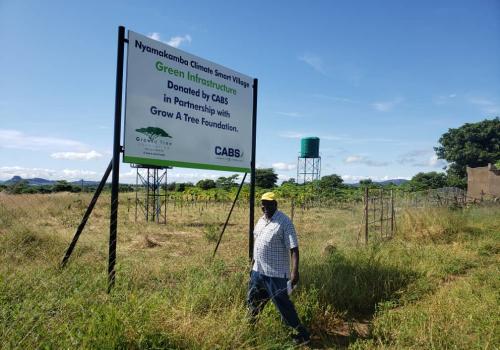There is a need to empower communities through sustainable projects that improve their livelihoods so that they do not resort to the wanton cutting down of trees.
This was said by Mr Kudakwashe Manyanga of Grow a Tree Foundation, a Zimbabwean non-profit organisation that seeks to raise awareness of the value of trees and combat deforestation through innovative re-afforestation and afforestation programmes.
Mr Manyanga was speaking during a SADC side event held at the UN Conference on Climate Change’s 27th Conference of Parties meeting (COP27) in Sharm el-Sheikh, Egypt. The side event was hosted by the Southern African Development Community (SADC) Secretariat on 11th November 2022 to strengthen networks for cooperation with other partners and to accelerate the implementation of the Green Great Wall Initiative (GGWI) in SADC Countries. The objective of the event was also to strengthen networks for cooperation among stakeholders, including raising awareness and build capacity on sustainable land management initiatives and programmes in the SADC Region.
Mr Manyanga commended SADC Secretariat for coming up with GGWI, a project that seeks to curb desertification through planting of trees and stopping environmental degradation, and said his organisation was very privileged to be a member of GGWI.
“One thing we loved is that this initiative is very practical and it is focused on livelihoods more than just planting trees. It is premised on the theory that if peoples’ livelihoods are addressed, then it’s easier for them to manage or appreciate the environment because it’s all about livelihoods. The key strategy that the GGWI focuses on is in roping CSOs (civil society organisations) and this has worked well,” he said.
He said Grow a Tree Foundation works with communities and knows their needs and what happens on the ground. The organisation speaks to the people and understands their challenges and why they cut down trees leading to deforestation.
“Deforestation is a concern and from that view point, it’s difficult for policymakers in high offices to understand the context on the ground, so working with CSOs is a good strategy,” he said, adding that one of the key issues which must be highlighted is the seed and seedlings collection by communities. He said for the SADC GGWI to work, there is a need to put in place a programme of seed and seedlings collection by communities and schools so that the tree planting programmes is successful.
“It is critical for us to achieve objectives of the GGWI and we must start at the bottom by empowering rural communities, and empower schools to collect the right seeds and germinate the seedlings. As a CSO, we are also playing that role in mobilising seed collection,” he said.
GGWI Ambassador Tabi Joda acknowledged the role of CSOs in the supporting the SADC GGWI initiative. He said collection tree seeds and seedlings was an important activity and likened it to the foundation of house. He said seed collection should not be a big issue as communities could use traditional knowledge passed on between generations and collect and preserve seeds for planting trees.
He said acceleration of the GGWI implementation requires a strong synchrony between Member States, CSOs and communities, with the CSOs being the connecting point between decision-makers, international organisations and regional entities like SADC.
There is a need for strong mobilisation of communities which should be responsive in taking serious roles in putting their lands back into a revived state and benefit from the holistic ecosystem and economic and social benefits of restoration. There should also be a deliberate programme from the local, and Member States levels, with SADC designing programmatic action geared on delivering jobs for young people, and actions that can stand the test of time.
He called on SADC to have a strong programmatic component so that the GGWI does not suffer and will be delivered to the frontline where communities will have the full benefits of the end goals.
Ms Mailes Zulu of Save the Environment and People Agency (SEPA), a non-profit making organisation which strives to improve the standard of living of rural communities and the poor in Zambia through climate resilient projects, said there was a need to ensure that the planted trees were provided with water, especially during the dry seasons.
“We need to make sure that when we write proposals, we put a component for water. Some trees do not germinate in certain areas because of geographical reasons. We need to make sure that each time we are planning for tree planting, we provide for watering the plants and definitely we will win the battle,” she said.

